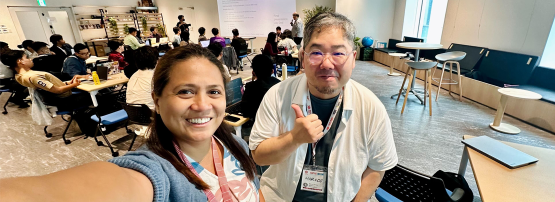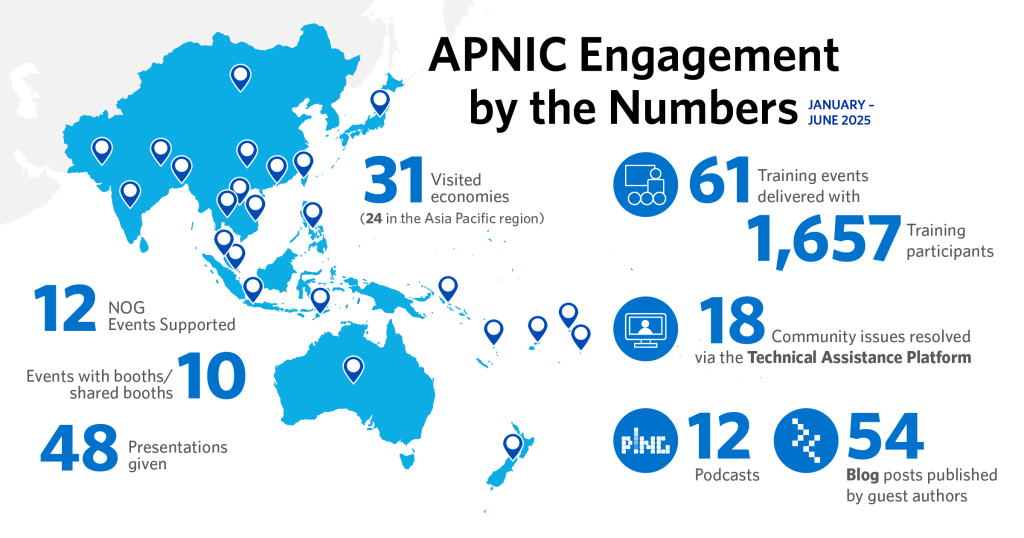
The APNIC region is the fastest-growing region for Internet users globally, comprising close to half of the world’s Internet users. APNIC community efforts to develop and strengthen Internet infrastructure and governance, knowledge sharing, and collaboration are critical to the open, stable, and secure Internet.
In the first half of 2025, APNIC continued to work with the Internet community across the Asia Pacific region, supporting these efforts. Below are some highlights.
ICP-2
Updating foundational Internet governance policies ensures they remain relevant in a changing technical and policy landscape.
The APNIC community recently concluded its engagement on the review of ICP-2, a 2001 policy guiding the recognition and governance of Regional Internet Registries (RIRs). The updated draft, now called the RIR Governance Document, aims to reflect the modern Internet while preserving transparent, community-led governance.
From 14 April to 27 May 2025, APNIC hosted webinars, community sessions, and outreach activities across the region, including events at NZNOG, TWNOG, INNOG 8, and more. Next, the NRO Number Council will review all feedback and revise the draft before sharing it again for further community input.
Policy development
APNIC policies are developed through a community-driven process, with the Secretariat supporting the community in shaping the operational rules that govern Internet number resources.
On the policy front, two WHOIS-related policy proposals, Prop‑162 (WHOIS Privacy) and Prop‑163 (Enhancing WHOIS Transparency and Efficiency Through Referral Server Implementation), were presented for community discussion at APRICOT 2025 / APNIC 59. Although neither proposal reached consensus, the Policy SIG Chairs returned them to the authors for further community consultation and encouraged the submission of revised versions incorporating feedback.
To further support regional engagement in the Policy Development Process (PDP), we shared explainer blogs, and APNIC presented at regional events and informal meetups.
Internet governance
As governance discussions grow more complex, regional forums play an increasingly important role in connecting the technical and policy communities.
On behalf of the Asia Pacific community, APNIC has actively contributed to regional and global Internet governance discussions in key forums and events around the region. This includes support for local Asia Pacific Internet Governance Academy (APIGA) events in India, Malaysia, and Taiwan, which help equip the next generation of Internet leaders with essential knowledge and skills.
APNIC also plays an ongoing role at national and global Internet Governance Forums such as the Bangladesh IGF (BIGF), Kawaka 2025, IGF 2025 and the Pacific IGF, taking place this week in Samoa, where it shares technical insights, training and advocates for multistakeholder collaboration.
Training and certifications
The exponential growth of Asia Pacific Internet users demands much from network operators, and technical skill remains central to Internet development. To support technical capacity across the Asia Pacific, APNIC Academy delivered 61 training sessions — both in-person and online — during the first half of 2025, reaching more than 1,657 participants. Topics covered included routing, IPv6, RPKI, network monitoring and management, and Internet security.
Supported by APNIC, the Bangladesh Telecommunication Regulatory Commission (BTRC) hosted a BTRC IPv6 Seminar, and IDNIC-APJII delivered an IPv6 Train-the-Trainer workshop, strengthening local capacity development and knowledge sharing.
Training partnerships with the Asia Pacific Internet Engineering Program (APIE) and the Asi@Connect Program have helped extend the reach of the APNIC Academy across the region. Through joint workshops, webinars, and hands-on sessions, these collaborations have supported network engineers and academic institutions with up-to-date knowledge sharing and best current practices.
Promoting IPv6: From training rooms to production networks
IPv6 adoption remains a critical ingredient to Asia Pacific Internet scalability and a cornerstone of APNIC’s community support. In the first half of 2025, 22 IPv6-related training sessions were delivered online and in person, across nine economies, training more than 700 participants on IPv6 design, deployment, and troubleshooting.
36 participants in Bangladesh and 12 in Thailand achieved IPv6 associate-level certification through APNIC Academy’s new IPv6 Certification, recognizing their expertise and readiness to work with and manage IPv6 networks.
Taking IPv6 technical advocacy beyond network operations to accelerate IPv6 readiness and deployment across the Asia Pacific region, APNIC contributed to national and regional forums and undertook direct engagements with regulators, governments, and APNIC Members. This included the 6th ICANN APAC-TWNIC Engagement Forum and 43rd TWNIC OPM, INNOG 8, and the India ISP Conclave 2025 (IISPC 2025).
The IPv6 momentum extended into information sharing as well. In May, a blog post on IPv6 and cPanel, assisted by APNIC’s Technical Assistance Program (TAP), proved to be a popular read with 2.3k views. This post will be complemented with a presentation during the IPv6 Deployment session at APNIC 60 in September.
RPKI and routing security: Practical steps, real results
RPKI deployment in the Asia Pacific has advanced through collaboration among operators, governments, regulators, and technical communities, with APNIC supporting efforts to improve routing security.
APNIC conducted 10technical assistance sessions and seven training events focused on RPKI and Network Security, supporting numerous economies, including Bangladesh, India, Pakistan, and the Philippines, delivering practical guidance to help strengthen RPKI readiness.
APNIC also contributed to local discussions and policy dialogues, engaging with stakeholders to raise awareness of the operational and security benefits of RPKI and encouraging adoption as part of broader efforts to enhance the resilience and trustworthiness of the region’s Internet routing infrastructure.
Growing IXPs and peering opportunities
Across the APNIC region, communities are actively strengthening interconnection and peering ecosystems through new and expanding Internet Exchange Points (IXPs).
In Fiji, the Philippines, and Malaysia, local efforts to develop IXPs have continued to progress. In Pakistan, a community-led IXP workshop — hosted by the Pakistan Telecommunication Authority (PTA) in collaboration with the Internet Society (ISOC) — brought together stakeholders for strategic discussions and technical training. A similar workshop focused on Pacific IXP development and peering opportunities was held during the PITA AGM.
These efforts are further reinforced by regional events such as the BKNIX Peering Forum, which help connect network operators, encourage collaboration, and build stronger regional peering ecosystems. APNIC supports these community initiatives through training, technical assistance, and knowledge sharing.
Security community development
Cybersecurity continued to be a focus for the community in the first half of 2025, with ongoing efforts to build knowledge, skills, and resilience across the region.
Community-led initiatives were supported by APNIC with hands-on training, knowledge exchange, and technical advice at events such as APAN 59 and Phoenix Summit 2025.
In collaboration with the Cyber Safety Pasifika program, specialized training for law enforcement agencies in the Cook Islands and Fiji helped to strengthen national capacity to prevent and respond to emerging cyber threats in the Pacific.
These efforts were complemented by community contributions to security-focused blog posts, presentations, and panel discussions, reinforcing the role of secure infrastructure in national digital strategies.
Looking ahead
Figure 1 is a snapshot of the Internet operations community’s activities across the region, supported by APNIC from January to June 2025. These figures reflect the diversity of local efforts, from training sessions to policy outreach to knowledge exchange, helping strengthen technical communities and capacity development throughout the Asia Pacific region.

As the second half of 2025 begins, and the Asia Pacific Internet community continues to improve routing security, develop local infrastructure, and support emerging talent, the goal remains clear: To help build a more resilient and inclusive Internet across the region.
To follow the latest community activities and opportunities, subscribe to the APNIC Blog and Orbit, and stay informed about local training opportunities and events happening across the region.
Community input remains vital — share your feedback via the User Feedback Group, feedback form, or post on the User Feedback Group on Orbit.
The views expressed by the authors of this blog are their own and do not necessarily reflect the views of APNIC. Please note a Code of Conduct applies to this blog.
